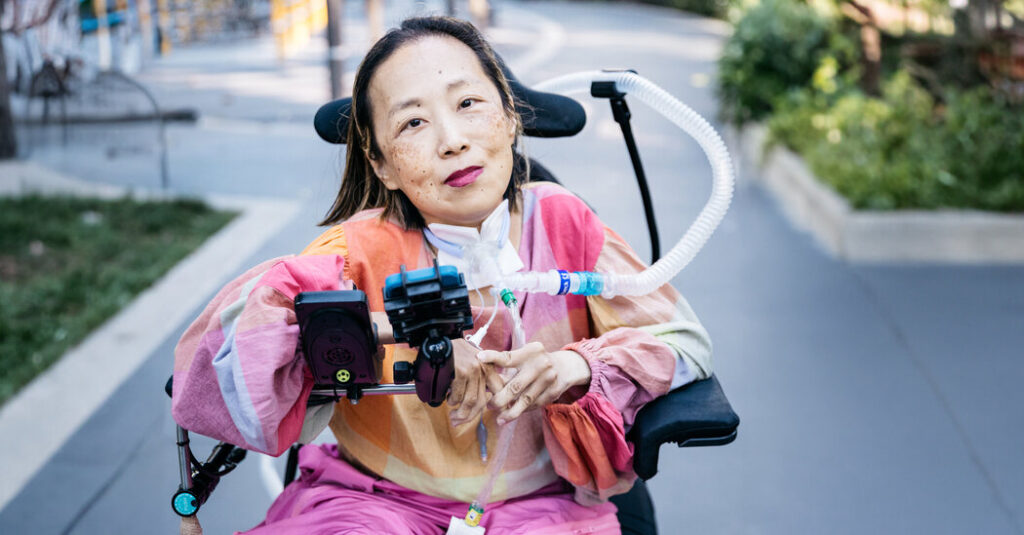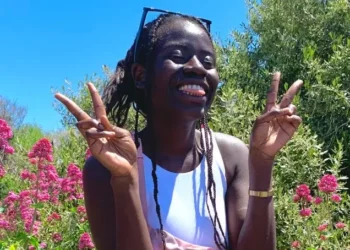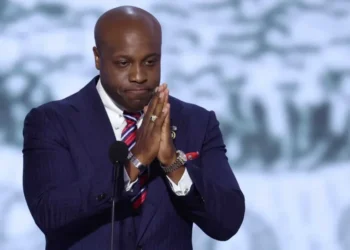Alice Wong, a writer and activist who was born with muscular dystrophy and who fought relentlessly for equal rights and access for disabled people, died on Friday in a hospital in San Francisco. She was 51.
The cause was an infection, said Abby Yim, a close friend.
In her 2022 memoir, “Year of the Tiger: An Activist’s Life,” Ms. Wong wrote about how she faced discrimination and bullying while growing up in Indiana, which drove her “to become more of an advocate and to use that individual anger to help other people.”
She founded the Disability Visibility Project in 2014 to interview disabled Americans about their lives. The endeavor, which operated in collaboration with StoryCorps, an oral history project, was intended to be a one-year effort in the run up to the 25th anniversary of the Americans With Disabilities Act, which broadened civil rights for people with disabilities. Ms. Wong’s work proved so successful that it kept going, and the project eventually collected hundreds of oral histories now housed at the Library of Congress.
The Disability Visibility Project spoke to one of her driving passions: to bring attention to disabled people as productive members of society even as society continues to push them into the margins.
“One of the things that really gives me joy is the fact that there are so many amazing, brilliant, creative disabled people out there,” Ms. Wong said in a 2020 interview on the podcast “City Arts & Lectures.” “But part of my rage — and it’s a very real rage — is that most people don’t really know about them.”
In 2024, the MacArthur Foundation awarded her a fellowship, commonly referred to as a “genius grant,” which includes $800,000.
Ms. Wong was adept at using social media, especially X, where she created online communities through hashtags like #criplit for writers with disabilities and #cripthevote, a voter advocacy effort.
She was concerned about what the 2024 re-election of Donald J. Trump as president would mean for disabled Americans and their health care.
“Trump has always been clear about who he is and what his plans are, which includes putting the Affordable Care Act’s Medicaid expansion back on the chopping block, with the very real possibility of millions of Americans losing their health coverage,” she told The Guardian in January.
She wrote extensively, in publications like The New York Times and Teen Vogue, using a casual, engaging style that helped underline the urgency she brought to disability rights.
“I am a Medicaid welfare queen,” she wrote in a 2017 guest essay in The Times about the importance of federally supported health care for people with disabilities to allow them to attend school, work and volunteer. “Medicaid is more than a health care program. It is a life-giving program.”
A self-professed nerd, she often used science-fiction metaphors to explain her life experience.
“I am a disabled cyborg that has gone through another series of augmentations that extended her life until another system fails,” she told The Guardian.
She called attention to laws that, while sometimes well-intentioned, overlooked the needs and rights of people with disabilities — for example, bans on plastic straws, which many people with physical impairments need to drink, or campus mask bans, which colleges have justified on public safety grounds, but which also increase the risk of disease for high-risk people like Ms. Wong.
She was especially critical of the way the medical establishment seemed to downplay her descriptions of constant pain or diminished breathing capacity.
“Even though I had muscular dystrophy, my entire life and was under the care of a neurologist,” she told The Guardian, “I was never told that part of my prognosis included increased weakness in my diaphragm, which meant needing respiratory support, especially when sleeping.”
At the same time, she helped spread positive news about advances in medical technology. After a tracheotomy left her unable to speak with her mouth, she was able to use a Passy Muir valve, which can restore speech and improves swallowing, an experience she shared in a 2023 essay in Teen Vogue.
Ms. Wong often emphasized the importance of community in her own life and in the advancement of disability justice.
“As a kid riddled with insecurity and internalized ableism, I could not see a path forward,” she wrote in a note posted to social media after her death. “It was thanks to friendships and people who believed in me that I was able to fight my way out of miserable situations into a place where I finally felt comfortable in my skin.”
Alice Wong was born on March 27, 1974, in Indianapolis. Her father, Henry, a jeweler, and her mother, Bobby (Li) Wong, a social worker, were immigrants from Hong Kong.
Her muscular dystrophy, the progressive muscle-wasting disease, began to affect her ability to walk in elementary school. She was slower than other students, which made her the object of ridicule.
One day, she recalled in her memoir, a teacher took her hand, and had the class walk behind them.
“Walking together, in tandem — adult-child, non-disabled-disabled, teacher-student — we set the pace for the entire class,” she wrote. “I have not felt that seen, safe or cared for by a teacher since.”
After completing high school, Ms. Wong enrolled at Earlham College in Richmond, Ind., but, after an episode of respiratory failure, she transferred to Indiana University-Purdue University Indianapolis so that she could commute from home.
She graduated in 1997 with a degree in English and sociology, moved to San Francisco and received a master’s degree in medical sociology — the study of how social factors shape health care — from the University of California, San Francisco in 2004.
She later worked as a staff research associate for the university’s Center for Personal Assistance Services, a program that helps people with disabilities live independently.
In 2013, President Barack Obama named her to a two-year seat on the National Council on Disability, a federal agency that advises Congress and the president.
Ms. Wong is survived by her parents and her sisters, Emily and Grace Wong.
In addition to her memoir, Ms. Wong edited two books of essays, “Disability Visibility: First-Person Stories from the Twenty-First Century” (2020) and “Disability Intimacy: Essays on Love, Care, and Desire” (2024).
After living with her parents for decades, Ms. Wong moved in 2024 into her own apartment in San Francisco with her cats, Bert and Ernie, and hosted dinner parties and casual get-togethers.
“I’m astounded that my body lasted this long, and I am thankful to still be around,” she told The Guardian. “Yes, life is a complete dumpster fire, but I am reminded that I am not alone, that I am in this with many others.”
Clay Risen is a Times reporter on the Obituaries desk.
The post Alice Wong, Writer and Relentless Advocate for Disability Rights, Dies at 51 appeared first on New York Times.




